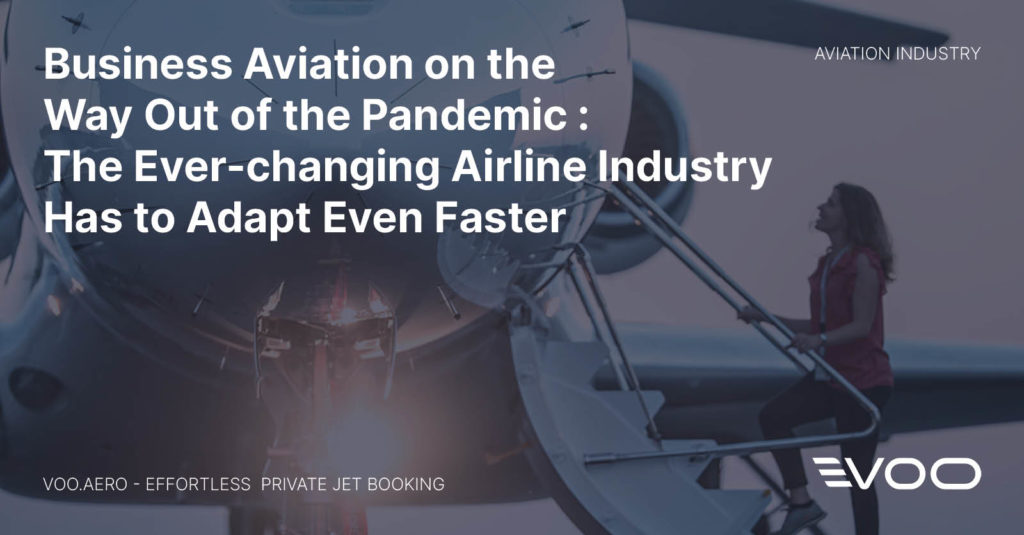In 2021, private aviation reached new heights. The evolution of the industry during the pandemic is primarily due to the fact that private flights have become the only option for passengers who want to have full control over their travels. Accessibility in a time of uncertainty has become an important factor and has given an added value to the concept of traveling by private jet, especially for those who turned to private aviation service for the first time. There are two main reasons for the surge: health and safety concerns related to the pandemic, and the prolonged downturn in commercial aviation, resulting in a significant reduction in the number of flights and destinations.
COVID-19 has irrevocably changed consumers’ behavior as well as the aviation sector. A growing number of people who fly for the first time by private jet are investing in comfort and safety. The transition to private flights is now turning into something other than an unaffordable luxury: an increasingly popular alternative to a premium ticket on a commercial flight. On the one hand, the difference between the price of flying on a private jet compared to the cost of a flexible business class ticket is diminishing. On the other hand, both individual travelers and companies are willing to pay more to reduce health risks for themselves and their employees.
In the near future, industry will be in a constant state of change, and those who react most flexibly will successfully overcome the crisis and manage to consolidate their position in their fields.
On top of that, private charter operators were partially banned from flying passengers during the pandemic because of the lockdowns and restrictions, therefore many operators had to quickly switch to cargo to be able to operate and generate revenue at all. This illustrates an important fact about private aviation, highlighting the industry’s degree of flexibility. In the near future, industry will be in a constant state of change, and those who react most flexibly will successfully overcome the crisis and manage to consolidate their position in their fields. In this respect, business aviation, with its medium-sized structure, is in a better position to react to uncertainty than the large corporations in the commercial airline industry.
Another major innovation in the business sector in 2022 is VOO, a revolutionary all-in-one B2B platform for direct search, booking, management and payment for private jet flights. This pioneering tool, developed by AVINOC, offers operators and brokers the opportunity to find the optimal solution for the entire fleet at lower costs and with higher profits in just one click. For the first time, direct search and booking of private jets online without calling and waiting for requests to be processed is now possible. By identifying and occupying this specialized niche, VOO offers an effective solution and a convenient functional tool for many industry representatives.
Much has been accomplished to stay afloat during the crisis, and more is yet to come for the aviation business to adapt to the new industry’s demands and to meet the ever-coming challenges. Private aviation was steady during the pandemic, reaching unprecedented heights and proving to be gradually becoming the new normal. The industry has been tested, adapting to the various demands of the field and has shaped important trends that have persisted.
Providing a guarantee of high safety and the highest comfort to new and existing customers and thereby establishing status as a reliable partner and expert in the business became the key to steadily strengthening a position in the industry.
Among them is a major trend – providing customers with a flexible and safe way to get to their destinations. While the number of commercial flights has significantly decreased, the demand for private jets has grown among wealthy and corporate customers who prefer to avoid busy terminals and overcrowded planes. Private business aviation is experiencing an expanding customer base due to an increase in the number of first-time passengers on private flights who now realize that it’s an amazingly flexible and safe way to reach their destinations, especially to locations with private air bases but without regular air traffic. Providing a guarantee of high safety and the highest comfort to new and existing customers and thereby establishing status as a reliable partner and expert in the business became the key to steadily strengthening a position in the industry. At the same time, a solid reputation attracts new customers and helps retain existing ones.
The trend for control and flexibility, which has been the hallmark of this travel segment ever since its inception and became the safety net for travelers during the pandemic, is now taking on a new dimension thanks to VOO.
Since the importance of digitalization leaves no doubt because it drives sector efficiency, reduces operational costs, increases customer engagement and reduces the aircrew workload, thereby maintaining a higher level of safety and reliability, the subsequent digital transformation is becoming crucial and more urgent to implement or adopt. Before VOO, the private jet booking process was largely organized manually; everything from the initial request to the confirmation of all data and services between all parties involved took more time than is necessary. Now the problem of spending a lot of time requesting, managing and paying for a booking has been solved once and for all. VOO offers its customers – namely charter brokers and private jet operators – a revolutionary all-in-one platform for direct search, booking, management and payment of private jet flights. This approach fundamentally changes the level of interaction between business aviation charter professionals, who can now immediately and accurately book what they need — not just the actual flight, but also their meal and entertainment — from a single source and in real time. In this way, the trend for control and flexibility, which has been the hallmark of this travel segment ever since its inception and became the safety net for travelers during the pandemic, is now taking on a new dimension thanks to VOO.
Providing service to newly acquired business customers from the cargo sector is another important emerging trend in the business aviation.
During the pandemic, some private aviation operators, due to a lack of passenger bookings, were forced to switch to air cargo for the first time and thus gained customers from a completely different segment. Continued periodic cargo flights for their newly acquired business customers is becoming an important component of the operators’ business. Moreover, because of the simpler and more direct approach of organizing air cargo transportation instead of serving the sometimes demanding needs of passengers continuing to work in this direction has undoubted benefits for operators. This has resulted in another important emerging trend in the business aviation – providing service to newly acquired business customers from the cargo sector.
Clearly, the pandemic has stirred up the whole industry and set it in a new direction. New opportunities presented themselves, and those who noticed this will definitely be ahead of the game after the pandemic. Business aviation still needs to pay close attention to its cost structure; however, capital requirements in the private jet industry are lower than in commercial aviation and investments are more manageable. Also, challenges such as aircraft shortages due to sanctions against Russia and rapidly rising prices, natural and artificial fuel shortages and many other newly emerging concerns continue to arise, and the industry has yet to adapt quickly to the changes.
Overall, the position of the private jet industry is favorable, and the sector is showing signs that it has the capacity to overcome the pandemic crisis and to meet future challenges.
Ivanna is a professional journalist and communications specialist; she channels her creative energy and passion for words to shape outstanding cross-media stories for VOO and the industry’s vibrant media. Ivanna holds a master’s degree in journalism and a professional development certificate in science communication.
- Private Air Charter: Are you Paying too Much?
- Optimizing Private Charter Price and Service
- The Empty Leg Evolution
- VOO | A Charter Marketplace BizAv: A Talk with CEO Robert Plhak by MixJet
- VOO Revolutionizes BizAv: A Q&A with CEO Robert Plhak by Business Airport International
- VOO’s Instant Booking Revolution: A Conversation with CEO Robert Plhak by EVA Magazine
- Outdated Systems in BizAv Charter Booking: VOO Comes to the Rescue
- The Challenge of Embracing Innovation in Business Aviation: A Conversation with Industry Experts
- Streamlining Quotes and Embracing Open Ecosystems for Efficiency in BizAv
- BizAv Seeks Efficiency Through Digital Transformation



